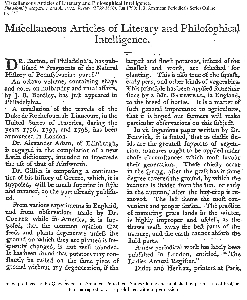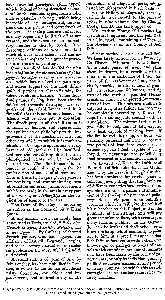 ―237― ―237―
Miscellaneous Articles of Literary and Philosophical
Intelligence.
DR. Barton, of Philadelphia, has pub-
lished “Fragments of the Natural
History of Pennsylvania: part I.”
An octavo volume, containing essays
and notes on husbandry and rural affairs,
by J. B. Bordley, has just appeared in
Philadelphia.
A translation of the travels of the
Duke de Rochefoucault Liancourt, in the
United States of America, during the
years 1796, 1797, and 1798, has been
announced in London.
Dr. Alexander Adam, of Edinburgh,
is engaged in the compilation of a new
Latin dictionary, intended to supercede
the use of that of Ainsworth.
Dr. Gillies is composing a continua-
tion of his history of Greece, which, it is
supposed, will be much superior in style
and manner, to the part already publish-
ed.
From various experiments in England,
and from observations made by Dr.
Cooper while in America, it is sup-
posed, that the common opinion that
seeds and plants degenerate unless the
ground on which they are planted is fre-
quently changed, is not well founded.
It has been found that potatoes may con-
stantly be raised on the same piece of
ground without any degeneration, if the
largest and finest potatoes, instead of the
smallest and worst, are selected for
planting. This is also true of the squash,
early peas, and other kinds of vegetables.
This principle has been applied sometime
since by a Mr. Bakewell, in England,
to the breed of horses. It is a matter of
such general importance to agriculture,
that it is hoped our farmers will make
particular observations on this subject.
In an ingenious paper written by Dr.
Fenwick, it is stated, that as elastic flu-
ids are the greatest supports of vegeta-
tion, manures ought to be applied under
those circumstances which most favour
their generation. These chiefly occur
in the spring, after the grass has in some
degree covered the ground, by which the
manure is shaded from the sun, or early
in the autumn, after the hay-crop is re-
moved. The last seems the most con-
venient and proper season. The practice
of manuring grass lands in the winter,
is highly improper and useless, as the
thaws wash away the best parts of the
manure, and the earth cannot absorb the
fluid parts.
A new periodical work has lately been
published in London, entitled, “The
Ladies Annual Register.”
Didot and Herhan, printers at Paris,
 ―238― ―238―
have invented stereotypes, (solid types)
which, instead of being detached charac-
ters like the common types, form a solid
mass or plate for each page, which being
incapable of any derangement, forever
preserves the purity and correctness of
the text. As these plates are preserved,
as many copies may be struck off as are
wanted, and the expense of an unneces-
sary number is thereby saved. The
stereotype editions of works are sold
much cheaper than others, and the in-
vention is thought to be a great improve-
ment in the art of printing.
Count Rumford has devised the plan
for an institution for the application of philo-
sophy to the improvement of the mechanical
arts, which has received the patronage
and active support of the most distin-
guished persons in Great-Britain, for
talents, rank, and fortune. Three thou-
sand pounds sterling have been already
subscribed towards defraying the ex-
penses of the establishment, and it is
supposed that this noble and benevolent
scheme will be soon put in execution.
The direct purpose of the institution is
to teach, by lectures and experiments,
the application of philosophy to the im-
provement of the mechanical arts, and
other arts of life to which it is most ap-
plicable. A complete apparatus for every
branch of philosophy will be furnished,
and men the most distinguished for their
philosophical talents, will be employed
as teachers. The establishment is in-
tended to consist of a repository for the
preservation of models of all new inven-
tions in the arts, an office of correspondence
for receiving and communicating new
information concerning all improvements
which are made in the arts in every part
of the world, and lectureships for the ap-
plication of science to the arts.
The Dean of St. Asaph is preparing
an edition of the works of Sir William
Jones.
A magnificent work has lately been
announced at Paris, entitled, “Picturesque
Travels in Syria, Phenicia, Palestine, and
Lower Egypt.” By Cassas, a celebrated
French painter, who has engaged the
assistance of Dutheil, Legrand, Langles,
and other literary characters, to render
his publication the more useful, splendid,
and perfect.
A second edition of Joan of Arc, by
Mr. Southey, has been published in Lon-
don, in which the author has introduced
many alterations, corrections, and im-
provements, and omitted many of the
miraculous and allegorical parts, which
have been disapproved in his first edition.
A new History of England, from the
earliest dawn of record to the peace of
1783, in nine volumes 8vo. by Charles
Coote, LL. D. has lately appeared.
Mr. Arthur Young still pursues his
agricultural inquiries, and has published
an useful work, containing a “View of
the Agriculture of the County of Suf-
folk.”
A new method of preparing cast steel
has been lately announced in France by
Cit. Clouet. His process is as follows:
Take small pieces of iron, and place
them in layers, in a crucible, with a
mixture of the carbonate of lime. Six
parts of the carbonate of lime, that is,
chalk, marble, limestone, and, in gene-
ral, all calcareous substances, and six
parts of the earth of pounded Hessian
crucibles, must be employed for twenty
parts of iron. This mixture must be so
disposed that, after fusion, the iron may
be completely covered by it, so as to be
kept from coming into contact with the
atmosphere. The mixture is then to be
gradually heated, and, at last, exposed
to a heat capable of melting iron. If
the fire be well kept up, an hour will
generally be found sufficient to convert
two pounds of iron into excellent and
exceedingly hard steel, capable of being
forged, an advantage not possessed by
steel procured in the common manner.
M. Lenz, Professor at the Institute of
Education of Schnepfenthal, near Gotha,
known by his Travels through Sweden,
has been employed for twelve years in
collecting every thing that the physicians
of different countries have written for or
against the total extirpation and annihila-
tion of the small-pox by means of police
regulations. He proposes to publish a
work, in which he will give the result of
his researches on this subject, and on the
possibility of the attempt, and will pay
great attention to state, with accuracy, as
many facts as possible. In the German
Journals he invites all those who have at
heart the happiness of mankind, to point
out to him, in a precise manner, either
such facts as have come within their own
knowledge, or passages in books of tra-
vels which contain an account of measures
that have been taken by the order of go-
vernments, or only by individuals, among
polished or savage nations, at any period,
or in any country, by which this terrible
contagion has been either removed or en-
tirely checked.
|